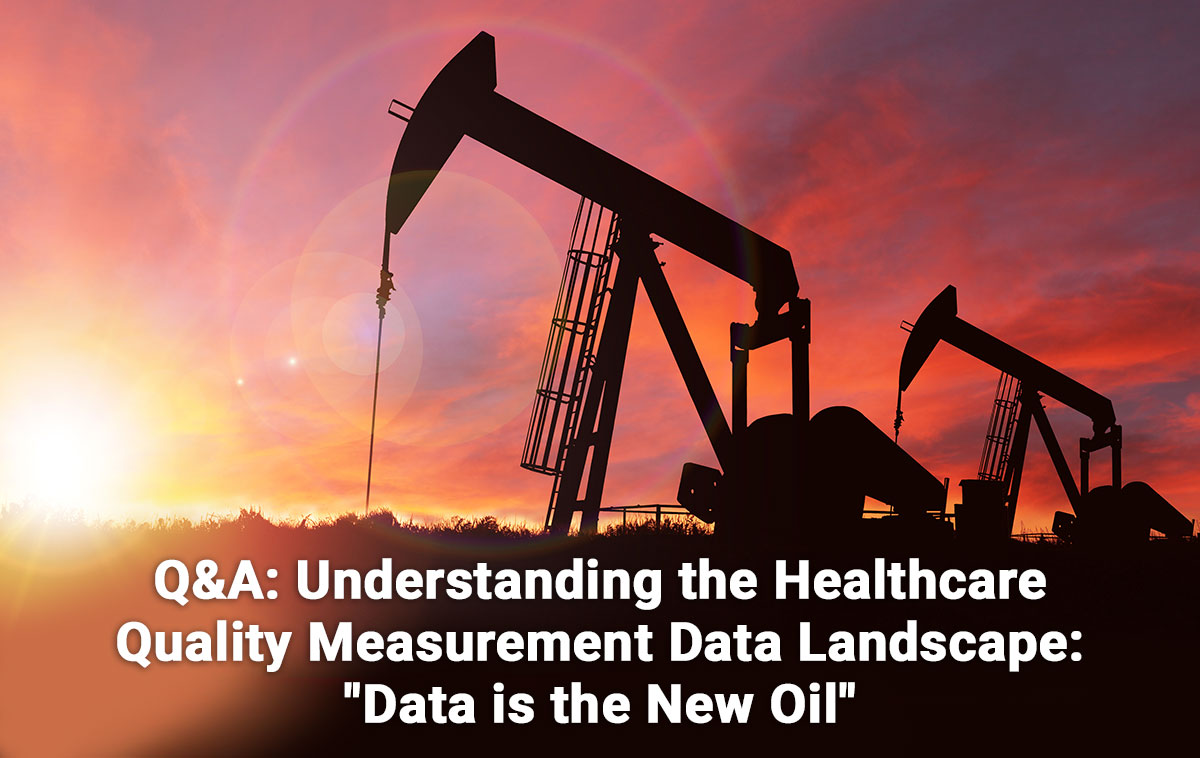Q&A: Understanding the Healthcare Quality Measurement Data Landscape: “Data is the New Oil”

Reid Kiser is the founder and president of Kiser Healthcare Solutions, LLC presented the webinar “Understanding the Healthcare Quality Measurement Data Landscape: “Data is the New Oil” recently and a recording can now be found on our YouTube Channel. Reid returned to answer many commonly asked questions on our blog.
Why is quality and quality measurement so important in healthcare?
Quality measurement has been around in healthcare longer than I have been alive. There was a resurrection in the late 1990s and early 2000s with several reports from the Institute of Medicine (now National Academy of Medicine) and other government and healthcare leaders recognizing the issues around waste, patient safety, and gaps in the quality delivered in our healthcare system. From the IOM came the six aims of why it is important to address quality in healthcare for safe, effective, efficient, timely, patient centered, and equitable care. The healthcare delivery system was rewarded or paid for doing more (Fee for Service) and not on if the care delivered actually had a positive result. Healthcare costs continued to rise double digits year over year, yet we were not improving patient experience and outcomes. Quality became the measuring stick for improving healthcare and we worked to control the rising economic and financial costs. Medicare Advantage started to pay for quality performance with Star ratings. Putting quality with resource use or cost, we get to “value”. This is where we see the system shifting from volume (or FFS) to value (or fee for quality/outcomes).
How do we measure quality in such a complex system and industry with numerous stakeholders?
Yes, it is complex and complicated. There are 1000s of quality metrics out there. And they come in many different shapes, sizes, flavors, you name it. Most measures are based on administrative or claims based transactions, some dive deeper into clinical results in the medical record, others are survey questions that rely on the recall of the patient’s experience. At the most basic level we currently measure based on the Donabedian principles of Structure, Process, and Outcomes. Simply put structure measures don’t guarantee a quality result, but they do measure things like are providers credentialed, are staffing levels appropriate, and are the proper operational policies and procedures in place. Process measures go a step further and measure if the proper events or services are taking place, was the patient screened for cancer, immunized, or other evidence-based care action. Outcome measures then tell us if things like blood glucose, cholesterol, blood pressure are controlled with the assumption that results in positive outcomes for the patient’s well-being and health. There are also other measures that look at resource use or cost and additionally patient-reported clinical outcomes. Now we can mix and match these together and create a “value” equation.
Why is data “the new oil” when it comes to healthcare quality measurement?
Taking all those measures, measure types, and data sources and tying those results to payment in a multi-trillion dollar industry is a huge paradigm shift that will have winners and losers from the business perspective. To demonstrate that a provider, a health plan or healthcare organization is able to prove their differentiation on values, has become exponentially important. There is a lot going on around building different systems and platforms to collect the data and then to processes it. Large amounts of venture capital and investors are moving in quickly. Let’s use this analogy. If you’re looking for oil, you need to understand what the landscape looks like to determine where it is and go find that oil basin. You explore, sometimes you find it, sometimes you don’t. When you do, you extract it, but there is more than just having crude oil. The next step beyond transporting it is to refine it, the equivalent of refining it is doing the analytics that leads to usable commodity. Turning that oil into fuel or other chemicals so that we can drive our car or build high value widgets at the  best price is the equivalent of healthcare data being “the new oil”. We do have to be cautious on if this becomes a barrier versus a facilitator. Technology development is expensive and there is a lot of capital investment at stake. Investors will want their ROI. Ideally, we have a mix of private and public partnerships aimed at improving the health of Americans.
best price is the equivalent of healthcare data being “the new oil”. We do have to be cautious on if this becomes a barrier versus a facilitator. Technology development is expensive and there is a lot of capital investment at stake. Investors will want their ROI. Ideally, we have a mix of private and public partnerships aimed at improving the health of Americans.
Reid Kiser is the founder and president of Kiser Healthcare Solutions, LLC. He is an innovative leader who has served in a variety of capacities with healthcare organizations over the past 20 years addressing healthcare quality, performance measurement, data analytics and reporting, and business systems design.

